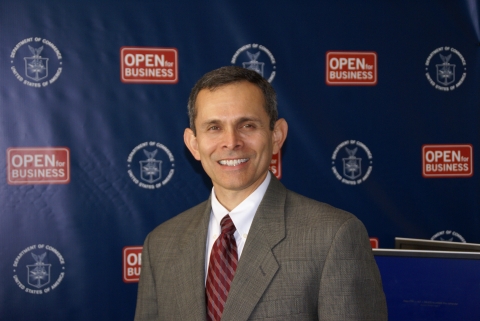Oct062014
Posted at 1:37 PM
Ed. note: This post is part of the Spotlight on Commerce series highlighting members of the Department of Commerce and their contributions to an Economy Built to Last in honor of Hispanic Heritage Month
Guest blog post by Efrain Gonzalez, Chief Financial Officer and Chief Administrative Officer, BusinessUSA
I currently serve as Chief Financial Officer and Chief Administrative Officer at BusinessUSA, a Presidential Initiative and partnership between the Department of Commerce and the Small Business Administration. Our mission is to help American entrepreneurs, businesses owners and executives successfully start and grow their business by making it easier for them to find and access the right government resources. Put simply, my role as part of BusinessUSA is to make sure people, money and strategy come together to achieve this mission.
From my first days at Commerce, I have been privileged to serve on initiatives and projects aimed to either directly serve the needs of businesses or assist the agencies that directly serve U.S. businesses. Prior to joining BusinessUSA, I served as Chief of the Office of Business Development for the Minority Business Development Agency where I worked on the Hurricanes Katrina and Rita Recovery Projects and the American Recovery and Reinvestment Act. For me, it’s this type of mission-driven work that we do here at Commerce that connects me to my roots as a first-generation American growing up in East Los Angeles and Montebello, California, a suburb just east of LA.
My father was an entrepreneur who owned a service station. Like many kids of hardworking business owners in this country, I spent my weekends working with him to support the family business. I watched him succeed, and I watched him struggle. I saw his commitment to his employees and how the responsibility of making his payroll sometimes weighed on him. Later, when I took over managing the business for a short time, I felt the weight of that responsibility myself. But, I think that just like many Mexican immigrants to this country, my dad thought that all those long days and weekends were a fair price for the opportunity to build a better life for his family. His hard work gave me the opportunity to attend good schools and eventually graduate from the University of Southern California (USC). My years running the family business helped to build the foundation that my career at Commerce and before that, at USC, has been built on.
My desire to work directly with small business owners was solidified during the 1992 civil unrest in Los Angeles. I lived in the center of the city, not far from where those now infamous events started. Businesses down the street from where I lived were looted and burned. I literally watched people’s dreams go up in smoke. I also saw how lack of economic opportunity creates despair, frustration and even deep rage. I think, like a lot of people, it made me look at what I was doing and what I could be doing. That moment in time helped me realize that I wanted to help others as a small business consultant.
The area around USC was surrounded by low-income neighborhoods and struggling businesses. The University developed an initiative to create economic opportunity in this surrounding community, and I decided that I wanted to be part of it. I started as a business consultant at the USC Business Expansion Network and helped entrepreneurs develop business plans, secure loans and obtain contracts. I saw firsthand the need for expanding access to capital for these business owners so that they could grow their businesses and create more jobs in their community. Eventually, I became Director of a Minority Business Development Center and Associate Director of the USC Business Expansion Network. I worked with community leaders and local governments to build coalitions and expand resources to help small businesses.
At USC, I worked with many entrepreneurs just like my dad, immigrants struggling to build a business and navigate the language and cultural differences. It was during this time that I began to understand what it means to be “bi-cultural.” While my first language was Spanish, all my education was in English and nearly all of my friends spoke English. Being “first-generation American” means that you always have one foot in the immigrant community that you come from, even though you may spend most of your life outside of that community. I think Hispanic Heritage Month provides a good way for us to look at that history and see how it has shaped us. It also lets us celebrate the contributions of the Hispanic community to this great country. As a Hispanic American, I’m proud of the Department of Commerce and its role in supporting this community.


